| 
by
"Metal" Larry Dolman
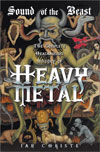 Over
the last few months, the Blastit-dudes have been borrowing
each other's metal CDs more and more. I'm not trying to tell
you that "metal is BACK" in the Borders newstand
sense of the phrase, where something has to be either HERE
or GONE or HOT or NOT. When the glossy advertising mags tell
you metal is back, that just means that the light turned green
again for hipsters to start making fun of hair metal power
ballads, and that they can wear their ironically purchased
Scorpions and Ratt T-shirts to costume parties again (even
though the bands they actually listen to for "enjoyment"
are Wilco, Interpol, and Radiohead).
Over
the last few months, the Blastit-dudes have been borrowing
each other's metal CDs more and more. I'm not trying to tell
you that "metal is BACK" in the Borders newstand
sense of the phrase, where something has to be either HERE
or GONE or HOT or NOT. When the glossy advertising mags tell
you metal is back, that just means that the light turned green
again for hipsters to start making fun of hair metal power
ballads, and that they can wear their ironically purchased
Scorpions and Ratt T-shirts to costume parties again (even
though the bands they actually listen to for "enjoyment"
are Wilco, Interpol, and Radiohead).
Well this ain't
about Crowd Control Central, this is about a bunch of people
who are almost completely over irony T-shirts and, without
having any big discussion about it, have been experiencing
and re-experiencing a real deep appreciation for metal. For
Sabbath (all eras), for Priest & Maiden (nearly ditto),
for almost the entire NWOBHM (maybe not State Trooper and
Atomkraft), for the living soul of Cliff Burton, for the differences
between power, thrash, death and black. These terms get thrown
around rather interchangeably by novices, but that's okay,
they may be learning. However, if you ever see anyone in a
possibly ironic Iron Maiden T-shirt, ask him or her right
away, "What does NWOBHM stand for?" If he or she
can't immediately rattle off the answer, it is your job to
physically tear the Iron Maiden T-shirt right off of their
chest and make them go to the electroclash party semi-nude.
(Also, before they leave, they have to give you all their
drugs so you can get stoned while staying home and listening
to Diamond Head. Because you DESERVE it.)
Into this new metal-appreciative
environment comes a timely rock history book: Sound of
the Beast, the Complete Head-Banging History of Heavy Metal,
by Ian Christe.
It may not be perfect; its publishers seem to be targeting
it to the Maxim Blender readers, with a 'breezy' appearance
that features a lot of 'time lines' and 'top ten lists.' (No
cleavage though -- not even a cheesecake shot of Doro Pesch!)
The good news is that the writing itself, which is fortunately
at least 94% of the book, is anti-hip and metal-appreciative.
This is because Christe has been a journalistic authority
on heavy metal since, I don't know, back when Alternative
Press magazine was still tolerable. He may be a bit of an
anti-hip hipster -- he has played in a band with Dame Darcy
-- but his understanding and respect for metal is unassailable.
I knew I was in wonderful hands after just reading the first
10 pages, in which Black Sabbath is declared the one true
originator of metal and their monu-fucking-mental career is
given the full credit it has always deserved.
This Sabbath
chapter was so stirring that it brought a small tear to my
eye, and did indeed stir me, from the bed where I had been
reading, and into my living room, so that I could play the
first Sabbath album on my stereo. While listening, I thought
of the legend Christe relates of how the album's producer
cut out an 18 minute guitar solo on "Warning" --
what, the album was supposed to be three-sided??? Now that
would have been heavy. Even without the lost 18 minutes
it's an amazing album. Still very much a blues album, too,
because in Great Britain, 1970, "heavy" simply did
not exist exclusively from "white blues." But this
is not just a blues band, this is a heavy progressive blues
band. Check out side two's epic conglomeration of "Sleeping
Village/A Bit of Finger/
Warning"; practically all of Blue Oyster Cult's output
could fit inside it, particularly every solo lick ever played
by Buck Dharma. Progressive, but what really made it great
was that these guys were punk too. In fact, listening to the
first Black Sabbath album, I was surprised how much it reminded
me of a raucous gig I had just seen that week by post-post-post-post-post-punk
band No Doctors. In both cases, I heard heavy and progressive
dirty psych-blooz that lurched, lumbered, and wailed. (Y'see,
No Doctors may be post-post-post-post-post-punk, but they're
also an absolutely brand-new kind of heavy white blues band
made up of punk 22 year olds, which means it's all come full
circle. The fact that there is an entire genre called "Stoner
Rock" is another example of a full circle that has been
made around the same sphere.)
But that's a tangent.
See, this book will get you listening to metal and thinking
about it. I think I mention this book or its author in every
single section of this column. What can I say, I already knew
a lot and it taught me even more. For example, Judas Priest
may not have broken big worldwide until the late 70s, but
in the metal lineage they were right on the heels of Sabbath;
they formed in 1970, were from the same city (Birmingham,
England), and even shared a practice space with The Great
Old Ones. What else....you might've heard that Les Claypool
of Primus auditioned to replace Cliff Burton in Metallica,
but I hadn't heard the reason he was rejected: for being "too
good." (Christe sums up Claypool's technique rather well
as "banjo-style bass playing.") What else . . .
another Metallica one: they were originally an L.A. band,
and the young James Hetfield's local idols were . . . Mötley
Crüe! However, when Cliff Burton refused to move from
his native San Francisco Bay to L.A. to be their bass player,
they wanted him so bad that they relocated to San Fran, from
where they became famous, and still reside today. What else
. . . I forget! Read the book!
POSTSCRIPT: Just
today, about a week before this is scheduled to go to print,
I was at the local underground press newstand and I saw that
the latest issue of Bridge
Magazine -- a pretty great and subtlely fucked-up literature
quarterly made here in Chicago -- contained a series of essays
on Metal, much like the series of essays you read here, except
they had literary figures like Rick Moody doing it instead
of me, a guy who answers to the name "Fuzz-O." So
I got beaten to the punch with the idea, but it does confirm
what I'm saying up there in the first sentence about how all
the "Blastit-dudes" are "getting into metal."
In fact, some of the guys behind the Bridge metal essays are
DJs at WHPK,
as am I. WHPK
just scored a sponsorship deal with Metal
Haven, one of the great specialty record stores I've ever
been to. The station also separated out all their metal CDs
into their own "metal" section. Even in the midst
of one of the worst government regimes in American history
it's still wonderful to be alive.
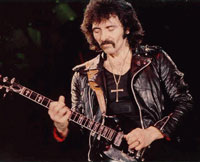 Speaking
of Sabbath, has anyone ever called them on the song "After
Forever," from Masters of Reality? It's funny,
because Harrington, in these very pages, talking about this
album, described Sabbath as "Godboys," which C.M.
Sienko got into further in his review of Weakling's huge Dead
As Dreams album, pointing out that although these bands
are singing about Satan, they weren't singing about how great
he was, but rather how much he was TORTURING them. Sabbath
was on Jesus's side! Something you may not have realized,
and if you don't believe me, get out your copy of Masters
of Reality, on which they've thoughtfully printed all
the lyrics on the back cover (Harrington sez in homage
to Sgt. Pepper!), and read the lyrics to "After
Forever" (they are written by Tony Iommi, which is rare
-- Geezer Butler usually wrote the lyrics -- was Iommi the
Christian narc of the group? -- hmm, look closely at the center
of the above photo -- that cross looks RIGHT SIDE UP to me):
"Have you ever thought about your soul -- can it be saved?
/ Or perhaps you think that when you're dead you just stay
in your grave. / Is God just a thought within your head or
is he a part of you? / Is Christ just a name that you read
in a book when you were in school?" Seriously, these
days even Christian Rock bands don't sing that explicitly,
for fear of turning people off. Sabbath could get away with
it because it's hard to call a band on their lyrics when they
just got done with a super-heavy song about how great smoking
weed is, and now they're absolutely kicking your ass with
the next song, and even if the lyrics are total Christian
propaganda you'll never notice! Speaking
of Sabbath, has anyone ever called them on the song "After
Forever," from Masters of Reality? It's funny,
because Harrington, in these very pages, talking about this
album, described Sabbath as "Godboys," which C.M.
Sienko got into further in his review of Weakling's huge Dead
As Dreams album, pointing out that although these bands
are singing about Satan, they weren't singing about how great
he was, but rather how much he was TORTURING them. Sabbath
was on Jesus's side! Something you may not have realized,
and if you don't believe me, get out your copy of Masters
of Reality, on which they've thoughtfully printed all
the lyrics on the back cover (Harrington sez in homage
to Sgt. Pepper!), and read the lyrics to "After
Forever" (they are written by Tony Iommi, which is rare
-- Geezer Butler usually wrote the lyrics -- was Iommi the
Christian narc of the group? -- hmm, look closely at the center
of the above photo -- that cross looks RIGHT SIDE UP to me):
"Have you ever thought about your soul -- can it be saved?
/ Or perhaps you think that when you're dead you just stay
in your grave. / Is God just a thought within your head or
is he a part of you? / Is Christ just a name that you read
in a book when you were in school?" Seriously, these
days even Christian Rock bands don't sing that explicitly,
for fear of turning people off. Sabbath could get away with
it because it's hard to call a band on their lyrics when they
just got done with a super-heavy song about how great smoking
weed is, and now they're absolutely kicking your ass with
the next song, and even if the lyrics are total Christian
propaganda you'll never notice!
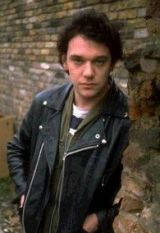 The
other day Mrs. Dolman came home with a very special gift for
me. She had been visiting some friends who were getting ready
to have their second child and move into a new house. The
lady of this house said something to the effect of "My
husband and his wild years -- just look at this!!" while
picking up a classic carnival-prize coke mirror featuring
a crude rendering of Iron Maiden's mascot Eddie, in the "Aces
High" fighter pilot role. "Give it to Larry,"
they said, joking, but my wonderful wife said, "Umm,
that's not really a joke, because Larry's really been getting
into metal lately. Can he really have it?" They said
yes, and it's one of the best things she's brought home to
me, ever. I immediately put it up on my wall and then went
to the archives to pull out some Maiden cassettes for the
appropriate soundtrack. That's when I learned for sure what
I had already been starting to hazily remember: that a few
years ago I had sold back all eight of the Maiden cassettes
I'd owned (everything through Seventh Son of a Seventh
Son). The
other day Mrs. Dolman came home with a very special gift for
me. She had been visiting some friends who were getting ready
to have their second child and move into a new house. The
lady of this house said something to the effect of "My
husband and his wild years -- just look at this!!" while
picking up a classic carnival-prize coke mirror featuring
a crude rendering of Iron Maiden's mascot Eddie, in the "Aces
High" fighter pilot role. "Give it to Larry,"
they said, joking, but my wonderful wife said, "Umm,
that's not really a joke, because Larry's really been getting
into metal lately. Can he really have it?" They said
yes, and it's one of the best things she's brought home to
me, ever. I immediately put it up on my wall and then went
to the archives to pull out some Maiden cassettes for the
appropriate soundtrack. That's when I learned for sure what
I had already been starting to hazily remember: that a few
years ago I had sold back all eight of the Maiden cassettes
I'd owned (everything through Seventh Son of a Seventh
Son).
I had to remedy the situation
as soon as possible, which I did by raiding the WHPK library.
They have the first four Maiden releases on vinyl, so I checked
'em out and listened in chronological order (they sound great
on vinyl, by the way), and I must say, that self-titled debut
is pretty damn hard to beat. Maybe I'm just rooting for the
underdog, but Paul Di'anno rules. The opener "Prowler"
is pretty great, with an instantly unforgettable guitar hook,
but it's track #2, "Remember Tomorrow," that just
slays me. It's a ballad, and I can't believe how calm and
moody it starts out, and then when Di'anno raises his voice
to a scream as the heavy guitars cascade in on the chorus,
it's as heavy as anything Maiden ever did. And how about the
psychedelic lyrics!: "Unchain the colours before my eyes/Yesterday's
sorrows, tomorrow's white lies/Scan the horizon, the clouds
take me higher/I shall return from out of fire," and
then, adding a touch of sci-fi paranoia, or religious awe,
or both, "Out in the madness, the all seeing eye/Flickers
above us, to light up the sky."
Of course "Running
Free" is an all-time anthem, driven by Di'anno's bad-ass
code-speak haikus: "Pulled her at the Bottle Top/whiskey,
dancing, disco hop." The second album Killers
is almost as good, with the all-time killer anthem "Wrathchild"
(with its own instrumental fanfare introduction called "The
Ides of March"), and the quite new wavey "Murders
in the Rue Morgue." Listening to the first two back to
back, I was all like forget Bruce Dickinson, gimme Di'anno!
But then I put on The Number of the Beast -- side
two first, because I figured the title track would be first
-- and that shit is just plain classic too. A lot of people
make fun of Dickinson with all his operatic wails, but the
word that popped into my head while I was listening was "muscular."
(And not for gay reasons.) Of course Piece of Mind
is fully stocked as well, but you already knew that, and I'm
still going with the debut as my favorite LP over anything
with Dickinson.
The thing about Dickinson
is that whenever he's playing people do the "aaaaaahhhhhhh!!!!"
joke, you know, the operatic metal singer imitation joke.
They mock him, in other words. It's practically as guaranteed
as someone shouting "Free Bird!" That's the thing:
he's mockable. You can't really mock Paul Di'anno's work with
Maiden, and that's why he wins.
(While researching those
lyrics I ran across a "What's your favorite Iron Maiden
album?" poll that had gotten over 7000 votes, and here
were the results: 1. Number of the Beast, 2. Powerslave
(kind of a surprise?), 3. Seventh Son of a Seventh Son
(good album, but definitely a surprise!), 4. Piece
of Mind, 5. Brave New World, 6. Somewhere
In Time, 7. Fear of the Dark (sorry Paul, this
is ridiculous), 8. Iron Maiden (finally, my vote
for number one), 9. Killers (actually my vote for
fourth, or even third). Shit, I'd put a Paul Di'anno's
Battlezone album ahead of Fear of the Dark. Just
kidding, I haven't heard either one.)
 Christe's
book devotes a few pages to the Paradise Lost documentary
and how Metallica had granted free use of their music to the
project. This was just one of a few convincing defenses Christe
made for Metallica's much-maligned-as-of-late career, putting
Load and the Napster imbroglio in the proper perspective,
as relatively recent missteps in what had been a very long
and mighty metal career. I found myself waking up to the fact
that Metallica had been my favorite band for years, and that
I really wanted to listen to 'em again, but had sold back
all of their albums too, also in the aforementioned Great
Cassette Purge of 1993. Christe's
book devotes a few pages to the Paradise Lost documentary
and how Metallica had granted free use of their music to the
project. This was just one of a few convincing defenses Christe
made for Metallica's much-maligned-as-of-late career, putting
Load and the Napster imbroglio in the proper perspective,
as relatively recent missteps in what had been a very long
and mighty metal career. I found myself waking up to the fact
that Metallica had been my favorite band for years, and that
I really wanted to listen to 'em again, but had sold back
all of their albums too, also in the aforementioned Great
Cassette Purge of 1993.
To get a quick fix I
rented Paradise Lost to hear the music, and because
the film itself had come highly recommended. I got my music
fix right at the beginning, when the opening guitar chimes
of "Welcome Home (Sanitarium)" rang out. And, I
got a lot more than that: the music was accompanying actual
footage from a police forensic crime scene video, depicting
the discovery of the naked and drained-of-blood corpses of
three 8-year old boys. The very next day I happened to read
an interview with hip-hop artist Aceyalone in the magazine
Yeti, in which he said, "The same thing goes to how tragic
murder is, but you see it in the movies all the time; we're
entertained by that. It's accepted, but a really harsh look
at it is disturbing, you know what I mean?"
I did know what he was
sayin', because I had experienced just such a "harsh
look" at murder the night before, in the opening moments
of Paradise Lost, and the stately gloom of Metallica's
funereal arpeggios have never sounded more tragic. Then when
Hetfield comes in with that vocal: "Welcome to where
time stands still/No one leaves and no one will." Psychedelic
as f******k. I think "(Sanitarium)" is one of the
most devastating metal songs of all time . . . and you can
trace it's roots directly back to Maiden's "Remember
Tomorrow."
 The
next step was to ask my co-workers if I could borrow any Metallica
albums they had, from the beginning up through the Black Album.
I figured anyone who buys records between the ages of 16 and
33 is pretty much guaranteed to have at least one or two.
Still, all I netted from this plea was ...And Justice
For All. Of course I really wanted to be spinning the
Burton years, but I love Justice too! Yes, it is
their fourth-best full-length, but that doesn't mean it isn't
a masterpiece. The much-maligned production is certainly strange,
but in a good way, yielding what sounds to me like a futuristic
form of airtight cyborg metal that still hasn't become the
norm. Ulrich's paper-thin insect-typewriter drumming is a
revelation. (It helps that by this recording he had thoroughly
mastered his double-kick technique.) The songwriting is not
only glorious prog overkill -- riff sequence after riff sequence
piled on top of each other to create some metallic cubist
skyscraper where only the 1st and 43rd floors look alike --
but the songs are also packed with tons of hooks. Anyone who
still has it but hasn't listened in a long time, put it on
and you might find yourself singing along with every line.
And finally, Kirk Hammett really shines on lead guitar: every
solo is a fully-formed miniature composition, brilliantly
condensing NWOBHM melodicism and attitude while incorporating
tones and textures from jazz and 20th-century composition
(those lessons from Joe Satriani were really paying off). The
next step was to ask my co-workers if I could borrow any Metallica
albums they had, from the beginning up through the Black Album.
I figured anyone who buys records between the ages of 16 and
33 is pretty much guaranteed to have at least one or two.
Still, all I netted from this plea was ...And Justice
For All. Of course I really wanted to be spinning the
Burton years, but I love Justice too! Yes, it is
their fourth-best full-length, but that doesn't mean it isn't
a masterpiece. The much-maligned production is certainly strange,
but in a good way, yielding what sounds to me like a futuristic
form of airtight cyborg metal that still hasn't become the
norm. Ulrich's paper-thin insect-typewriter drumming is a
revelation. (It helps that by this recording he had thoroughly
mastered his double-kick technique.) The songwriting is not
only glorious prog overkill -- riff sequence after riff sequence
piled on top of each other to create some metallic cubist
skyscraper where only the 1st and 43rd floors look alike --
but the songs are also packed with tons of hooks. Anyone who
still has it but hasn't listened in a long time, put it on
and you might find yourself singing along with every line.
And finally, Kirk Hammett really shines on lead guitar: every
solo is a fully-formed miniature composition, brilliantly
condensing NWOBHM melodicism and attitude while incorporating
tones and textures from jazz and 20th-century composition
(those lessons from Joe Satriani were really paying off).
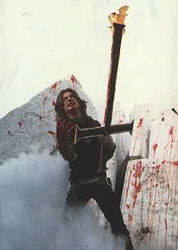 Another
student of Satriani's was Larry LaLonde, one of the guitarists
for Possessed. He went on to join a certain platinum-selling
Bay Area band that combined shameless Residents aping with
obnoxious "banjo-style" funk-metal bass playing.
When they were able to keep the funk and quirk at bay, they
could be pretty heavy and dark, but that wasn't very often.
I won't go into all that, though, because I'd rather mention
Possessed. LaLonde was like 15 years old when he played in
Possessed, and they were fucking SICK. I've listened to Seven
Churches tons in the last few weeks, and I still have
no idea what's even going on. Just a sick blur of crazed satanic
subject matter and twisted riffs. Another
student of Satriani's was Larry LaLonde, one of the guitarists
for Possessed. He went on to join a certain platinum-selling
Bay Area band that combined shameless Residents aping with
obnoxious "banjo-style" funk-metal bass playing.
When they were able to keep the funk and quirk at bay, they
could be pretty heavy and dark, but that wasn't very often.
I won't go into all that, though, because I'd rather mention
Possessed. LaLonde was like 15 years old when he played in
Possessed, and they were fucking SICK. I've listened to Seven
Churches tons in the last few weeks, and I still have
no idea what's even going on. Just a sick blur of crazed satanic
subject matter and twisted riffs.
Go freak out to it yourself,
but first read this quote from Christe's book by bassist/vocalist
Jeff Becerra, describing how he joined the band: “I
wanted to go heavier anyway. I was more into being heavy as
far as drinking beer, going out with as many girls as I could,
and playing as fast and heavy as I could, like Motörhead.
I asked Mike [Torrao] what the name of the band was, and he
said ‘Possessed.’ I said it sounded kinda satanic,
and he said, ‘Well, it is!’ That was kinda scary.”
(The background image on this
site and the photo of Jeff Becerra above come from the
OFFICIAL Possessed Home Page.)
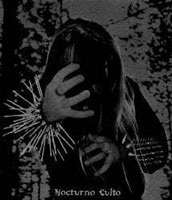 Darkthrone's
Transilvanian Hunger is kind of emerging as the Citizen
Kane of black metal albums, and a lot has already been
written about it, but I have one more thing to add. You see,
it's not as simple as whether or not I'm saying that this
is a kick-ass album. I just wanted to point out that, even
though I've grown up listening to Sabbath, Maiden, Priest,
Slayer, and all kinds of other blatantly satanic music, listening
to Transilvanian Hunger marks the first time I have
ever actually FELT THE PULL. You know what I'm talkin' about:
the dark side. Palpable this time. Not just a comic book.
I did manage to shake it off about 15 minutes into the album,
and then observe it from a more critical distance. Thanks,
God. Darkthrone's
Transilvanian Hunger is kind of emerging as the Citizen
Kane of black metal albums, and a lot has already been
written about it, but I have one more thing to add. You see,
it's not as simple as whether or not I'm saying that this
is a kick-ass album. I just wanted to point out that, even
though I've grown up listening to Sabbath, Maiden, Priest,
Slayer, and all kinds of other blatantly satanic music, listening
to Transilvanian Hunger marks the first time I have
ever actually FELT THE PULL. You know what I'm talkin' about:
the dark side. Palpable this time. Not just a comic book.
I did manage to shake it off about 15 minutes into the album,
and then observe it from a more critical distance. Thanks,
God.
So what is it about
this album that makes it one of the most effective evocations
of evil ever recorded? For one thing, every song sounds unrelentingly
similar, a tactic which hammers home a certain mood so hard
that it starts to fill up your soul. The basic formula that
repeats itself so unapologetically is a contrast between a
high-speed blast-beat rhythm below, and the dark calm of the
chord changes above. The changes spread out like a great fiery
black mist above the rumbling, which lurks at the bottom of
the music much like the deadly undertow of the ocean is hidden
underneath centuries of lapping waves. All these elements
are in place the very second the album begins. I can't think
of another album that goes from 0 to 120 this instantaneously.
On one black night when I was not sober I put this record
on loud, and as the black mist washed out of my speakers I
felt my head literally fall backwards in some combination
of bliss and surrender.
I remained in this
highly suggestible dream-slump until the first vocals rang
out, Nocturno Culto's whisper screaming from what sounds like
the other side of a black Norwegian canyon, a post-hypnotic
suggestion that awakened me from my deep dark bliss state.
It is the lyrics that specifically invite the listener to
set foot into the waves so that the undertow may fully take
effect. My eyes opened, and I felt myself, as if my hands
were not my own, pulling out the accompanying lyrics and following
along (something I rarely do, and never on my first listen
to an album). This is when I most strongly felt THE PULL.
I followed along as Nocturno
Culto sang in that perfect unspeakable voice, fire-breathing
winter cold and mortuary odor, practicing the tried and true
hypnosis technique of repetition: "Transilvanian
Hunger . . . the Mountains are Cold . . . Cold . . . Cold
. . . Soul . . . Cold . . ." After I was suitably
affected, the specific recruitment effort began: "Take
me . . . can't you feel the Call . . . Embrace Me Eternally
in your daylight slumber . . . To be Draped by the Shadow
of your Morbid Palace . . . ohh, Hate Living . . . The only
heat is warm blood . . . Feel the Call Freeze you with the
Uppermost Desire . . . Transilvanian Hunger, my Mountain is
Cold . . ." And then, more hypnosis: "So
Pure . . . Evil . . . Cold . . . Transilvanian Hunger . .
."
The long pauses between
phrases, and even between words, gave me plenty of time to
focus my leaden gaze on the CD's inner sleeve art, a drawing
of a grand forested valley at night, cryptically labelled
"Ferdasyn." Here the band provides you not only
with the call to go, but a specific picture for you to go
into. This is the black canyon from which Culto sings, perched
atop the far rim. Staring into the picture, I easily felt
myself standing within the woods at the bottom of the valley,
feeling an utterly morbid calm as the lyrics welcomed and
comforted me: "Cold . . . Cold . . . Soul . . . Cold
. . ."
And then I shook off.
I snapped out of the hypnosis. Maybe I just passed out. Either
way, I managed to shake off the forces of evil and return
to my dull and relatively safe life. Now, even the rush of
the opening chords of the album is something I've heard enough
to develop a tolerance for. But, sometimes still, halfway
through the song, when the opening rush refrains, and Nocturno
Culto comes out of a chorus by singing "AAAAAGGGGHHHHH!"
my neck goes weak and my head slips backwards like a newborn
baby's as I dream of Ferdasyn . . . so cold . . . cold . .
. pure . . . cold . . .
 It's
a funny thing about Thin Lizzy -- a lot of people who think
they love 'em because of their bad-ass name are disappointed
when they actually hear their music the first time -- because
it sounds like Seger! Or Springsteen! It's true -- the chords
are often jazzy, the melodies often bluesy, the lyrics and
delivery always heartfelt. A saxophone would not be out of
place -- but they didn't use one, which says a lot. The more
you listen, the heavier it all gets. I think it was described
best by (guess who?) Ian Christe when he described Lizzy as
"the missing link between Steely Dan and Iron Maiden."
And once you really get into it, it's much better than that
would even suggest. It's
a funny thing about Thin Lizzy -- a lot of people who think
they love 'em because of their bad-ass name are disappointed
when they actually hear their music the first time -- because
it sounds like Seger! Or Springsteen! It's true -- the chords
are often jazzy, the melodies often bluesy, the lyrics and
delivery always heartfelt. A saxophone would not be out of
place -- but they didn't use one, which says a lot. The more
you listen, the heavier it all gets. I think it was described
best by (guess who?) Ian Christe when he described Lizzy as
"the missing link between Steely Dan and Iron Maiden."
And once you really get into it, it's much better than that
would even suggest.
Most people seem
to prefer the Jailbreak album, from 1978, featuring
their biggest hit, an unassailable choice, but for some reason
Johnny the Fox, from 1976, is the one for me. I was
way into it in high school and now that I've pulled my Sony
HF 90 Normal Bias dub back out -- Black Rose on the
other side -- which Troy Van Horn made for me SIXTEEN YEARS
AGO I'm way into all over again. And getting more out of it:
back then, I might have heard that underground superstar bassist/vocalist
Phil Lynott was a drug user, but I never realized just how
much of himself he was projecting with the characters and
lyrics of his songs. Just look at the opening cut, "Johnny,"
on the surface a hokey tale about how "Somewhere on the
waterfront Johnny's hiding with a gun" -- the Springsteen
kind of thing that may scare some people away -- but there's
more to it, as "Johnny" is a junkie who breaks into
drugstores, "to cure his daily need." Lynott the
junkie plays Johnny the junkie convincingly, his performance
searing when he sings the fictionalized lines "You see
that nun, she's his sister / She doesn't know that he's gone
bad / When they told it to his father / It drove the old man
mad." The way he growls the last line, I just know Phil
is singing about his own family, whether his real-life sister
was a nun or not, or whether he even had a sister. The anguished
chorus of "Oh Johnny! Oh Johnny!" really gets to
me, because he really just means "Oh Phil! Oh Phil!"
Track two "Rocky"
is about a different, more upbeat side of Lynott's personality,
one he's sang about before: The Rocker. Just listen to him
chew his way through the line "Cocky Rocky's a rock and
roll star!," using the techniques of consonance, illiteration,
and internal rhyme that pepper all of his songs. Next is “Borderline,”
a huge sorrowful ballad. I love the echo effect on the opening
chords, and for anyone who overlooks Lynott’s bass playing
due to his mammoth vocal/lyrical presence, check the way he
weaves a simple high bass note into the main arpeggios of
this song.
“Don’t
Believe a Word” was a U.K. hit single, and it’s
easy to see why, with it’s swaggering riff, and Lynott’s
soul man con game: “Don’t believe me if I tell
you/That not a word of this is true.” Also notable for
the plangent lines in Brian Robertson’s guitar solo,
and especially the opening note of the solo, for which Robertson
bends a single blues note up, opening the wah effect as the
note rises – a simple idea, but he plays it like the
first guy ever to think of it.
Next comes “Fool's
Gold,” with its devastating heavy metal spoken intro,
Lynott intoning historical pronouncements in his grave accent
(“In the year of the famine/When starvation and black
death raged across the land…”) while the guitars
play single lines that blend into forlorn chords as only Lizzy
can. Then, after this brief fanfare, the very riff from Pat
Benatar’s #1 single “Hit Me With Your Best Shot”
kicks in, four years early, a slightly slower and much more
stately treatment. I love the line, late in the song, when
Lynott furthers the album’s vague concept: “Oh
my God is there nothing that can save her . . . in steps the
Fox to thunderous applause…”
“Johnny
the Fox meets Jimmy the Weed” is an infamous tune in
which Lizzy proved that funk-metal didn't have to be a bad
word, long before the Chili Peppers and Mind Funk and whoever
bastardized the form. Grandmaster Flash was listening up in
the Bronx, and got hold of a copy, which he worked seamlessly
into his DJ sets. (For killer evidence see The Official
Adventures of Grandmaster Flash, STRUT CD 011.) I’m
sure it was mainly because of Brian Downey’s awesome
funky beat, and all the space (for scratching!) left by the
ultra-cool guitar and bass riffs, but one lyric in particular
probably also caught Flash's ear: “Around the Bay/They've
got some crazy DJs/Send you right out to heaven."
I love every song
on this album with all my heart, but that's probably enough
description for now. (There are more great tracks, like “Sweet
Marie,” which I thought was a little maudlin on my first
couple listens, but it just gets so deep the more time I spend
with it. A lament about being on the road that Mssrs. Perry
and Bongiovi surely looked up to, with another great Phil
aphorism: “Home is where the heart is, but my heart
is not at home.” I'd also like to mention “Boogie
Woogie Dance” -- this song is like a test run for "Bad
Reputation," the stone classic that came out a year and
two albums later (and was recently featured to great effect
in the Dogtown and Z-Boys skateboarding documentary),
with the same kind of killer metal riffing and powerhouse
Downey beat.)
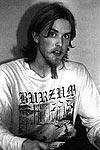
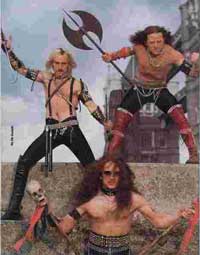
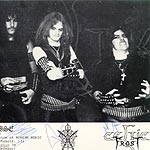
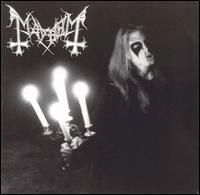
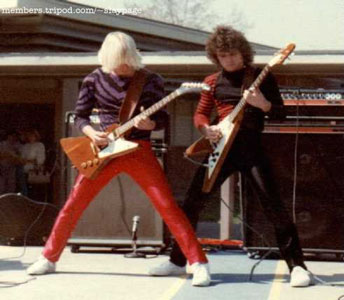
GALLERY:
Varg Vikernes, wearing his own band's T-shirt . . . Venom
-- the hatchet makes it . . . Celtic Frost, looking incredible
. . . Dead carrying a chandelier on the cover of Mayhem's
Live in Leipzig . . . and a bonus pic of Slayer live
in 1982!
Damn,
Varg Vikernes is one of the worst black metal singers ever.
I can't stand looking at his picture either. (Nice beard-braid,
dude.) Music is great, at least on the early Burzum stuff,
but the vocals practically ruin it. The best black metal vocals
are where you assume it's all screaming but after a few lines
you start to wonder if maybe it's actually just whispering
(secrets in your ear). As for Varg, I'm tempted to describe
it by borrowing the kind of phrase I hear all day out on the
street when I'm sitting at my window, and say that he just
sounds "like a whiny little bitch." Oh yeah, he's
also criminally insane. . . . . Celtic Frost's To Mega
Therion is the album everyone recommends by them. It
does have an incredibly bad-ass name, but I much prefer their
EPs Morbid Tales and Emperor's Return. Of
course the song that goes "Are you morbid??" is
classic for being bad-assedly humorous, but then the song
on To Mega Therion that goes "Hey!" is
just as good in that department. I don't know what it is that
makes the EPs better, just something about the production.
More hooks, too . . . . . The
Venom song that has been knocking me out the most is "In
League With Satan." Holy shit what a chorus: "EVIL!
In league with SATAN!" But man these guys could
NOT play together all that well. They were truly the Shaggs
of Metal. (There's even a visual resemblance!) Listen to any
live Venom bootlegs for proof -- I played one on the radio
the other day without previewing it and my jaw was scraping
the ground the whole time as the band struggled to change
from one part to the next. I can't wait to hear it again .
. . . . . . . Mayhem's Live in Leipzig may not be
their definitive record, but then again it might be. It's
a soundboard recording featuring what All Music Guide calls
"the classic lineup" (even though they credit the
group as "Necrobutcher - Group Member, Maniac - Group
Member, Blasphemer - Group Member, Hellhammer - Group Member",
which doesn't seem quite right). Vocals, by Dead, are mixed
super loud to bloodcurdling effect, although Count Grishnackh
(Varg Vikernes again!)'s bass often seems to go the way of
Newsted's on ...And Justice For All. That just leaves
Euronymous's guitar and Hellhammer's drums, and they absolutely
shred in a thrashing unison that makes me think of Greg Ginn
and Black Flag, except it's even faster and the riffs have
more tritones . . . Been hearing lots of good things about
High on Fire without actually hearing them, but I finally
got to when a co-worker showed up with Surrounded By Thieves,
and holy shit! I might never listen to Sleep again! Somehow
they sound just as slow and static as Sleep did, while simultaneously
sounding MUCH faster than Sleep did. It must the drummer --
he goes off, caterwauling around the methodical low-end riffs
in a way that reminds me of Boston punk metal band Jerry's
Kids and their amazing drummer Brian Betzger, on their 1983
debut EP.

|
